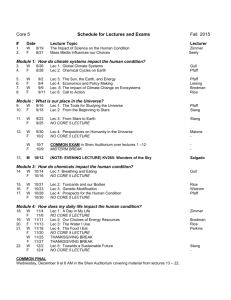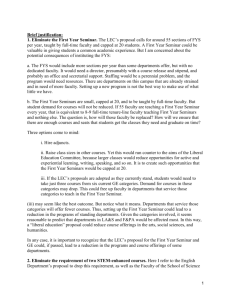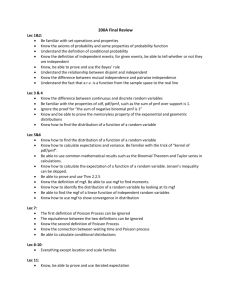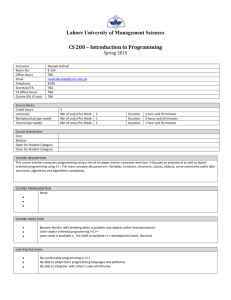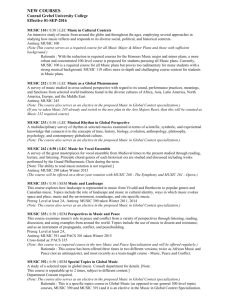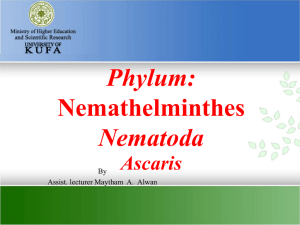Pathway Title: Earth Science A levels: Maths & Chemistry AS/A2
advertisement
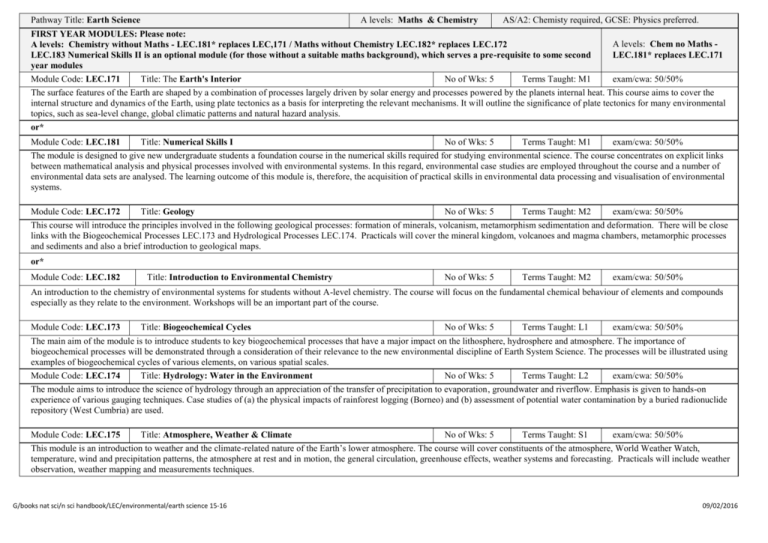
Pathway Title: Earth Science A levels: Maths & Chemistry AS/A2: Chemisty required, GCSE: Physics preferred. FIRST YEAR MODULES: Please note: A levels: Chem no Maths A levels: Chemistry without Maths - LEC.181* replaces LEC,171 / Maths without Chemistry LEC.182* replaces LEC.172 LEC.183 Numerical Skills II is an optional module (for those without a suitable maths background), which serves a pre-requisite to some second LEC.181* replaces LEC.171 year modules Module Code: LEC.171 Title: The Earth's Interior No of Wks: 5 Terms Taught: M1 exam/cwa: 50/50% The surface features of the Earth are shaped by a combination of processes largely driven by solar energy and processes powered by the planets internal heat. This course aims to cover the internal structure and dynamics of the Earth, using plate tectonics as a basis for interpreting the relevant mechanisms. It will outline the significance of plate tectonics for many environmental topics, such as sea-level change, global climatic patterns and natural hazard analysis. or* Module Code: LEC.181 Title: Numerical Skills I No of Wks: 5 Terms Taught: M1 exam/cwa: 50/50% The module is designed to give new undergraduate students a foundation course in the numerical skills required for studying environmental science. The course concentrates on explicit links between mathematical analysis and physical processes involved with environmental systems. In this regard, environmental case studies are employed throughout the course and a number of environmental data sets are analysed. The learning outcome of this module is, therefore, the acquisition of practical skills in environmental data processing and visualisation of environmental systems. Module Code: LEC.172 Title: Geology No of Wks: 5 Terms Taught: M2 exam/cwa: 50/50% This course will introduce the principles involved in the following geological processes: formation of minerals, volcanism, metamorphism sedimentation and deformation. There will be close links with the Biogeochemical Processes LEC.173 and Hydrological Processes LEC.174. Practicals will cover the mineral kingdom, volcanoes and magma chambers, metamorphic processes and sediments and also a brief introduction to geological maps. or* Module Code: LEC.182 Title: Introduction to Environmental Chemistry No of Wks: 5 Terms Taught: M2 exam/cwa: 50/50% An introduction to the chemistry of environmental systems for students without A-level chemistry. The course will focus on the fundamental chemical behaviour of elements and compounds especially as they relate to the environment. Workshops will be an important part of the course. Module Code: LEC.173 Title: Biogeochemical Cycles No of Wks: 5 Terms Taught: L1 exam/cwa: 50/50% The main aim of the module is to introduce students to key biogeochemical processes that have a major impact on the lithosphere, hydrosphere and atmosphere. The importance of biogeochemical processes will be demonstrated through a consideration of their relevance to the new environmental discipline of Earth System Science. The processes will be illustrated using examples of biogeochemical cycles of various elements, on various spatial scales. Module Code: LEC.174 Title: Hydrology: Water in the Environment No of Wks: 5 Terms Taught: L2 exam/cwa: 50/50% The module aims to introduce the science of hydrology through an appreciation of the transfer of precipitation to evaporation, groundwater and riverflow. Emphasis is given to hands-on experience of various gauging techniques. Case studies of (a) the physical impacts of rainforest logging (Borneo) and (b) assessment of potential water contamination by a buried radionuclide repository (West Cumbria) are used. Module Code: LEC.175 Title: Atmosphere, Weather & Climate No of Wks: 5 Terms Taught: S1 exam/cwa: 50/50% This module is an introduction to weather and the climate-related nature of the Earth’s lower atmosphere. The course will cover constituents of the atmosphere, World Weather Watch, temperature, wind and precipitation patterns, the atmosphere at rest and in motion, the general circulation, greenhouse effects, weather systems and forecasting. Practicals will include weather observation, weather mapping and measurements techniques. G/books nat sci/n sci handbook/LEC/environmental/earth science 15-16 09/02/2016 SECOND YEAR MODULES Module Code: LEC.270 Title: Environmental Field Course – Lake District No of Wks: 1 Terms Taught: Pre-M cwa: 100% Pre-requisite: LEC172, 174 & 175 This is a residential field course held in the Lake District in the week prior to start of the Michaelmas Term of the second year. Groups of approximately 10 students work together on hydrological, geological, geochemical, surveying and erosion projects. Training is provided through 6 days which offer complementary field skills and insight into local environmental processes. The aims are (1) to assess the present and future impacts on water quality of a disused tungsten mine and (2) to provide training in environmental field techniques. Coursework only, no examination. 15 credits Module Code: LEC.243 Title: Data Collection and Analysis No of Wks: 10 Terms Taught: M exam/cwa: 50/50% All scientists need to be able to understand the scientific method, to design experiments, to be able to collect data in an unbiased scientific manner, to analyse it using robust statistical techniques and to present it in a clear and concise form, in an appropriate medium and in a way that is appropriate to a relevant audience. The aim of this module is to introduce students in these complementary methods, with a view to providing individuals with the skills they will need to successfully complete their final year projects. Module Code: LEC.276 Title: Aquatic Biogeochemistry CORE MODULE No of Wks: 5 Terms Taught: M2 exam/cwa: 50/50% The aims are to introduce students to (1) the nature of aquatic systems from a chemical standpoint, (2) the main processes and factors governing the chemical composition of natural waters, (3) a range of case studies to illustrate 1 and 2, and (4) various analytical methods and analytical quality control considerations. 15 credits Module Code: LEC.274 Title: Geological Mapping No of Wks: 1 Terms Taught: S4 cwa: 100% Pre-requisite: consultation with Dr Steve Lane This is a six day residential course, held in SW Mull, Scotland, which provides training in geological mapping. Students will collect field data in order to make a single solid geological map. Students will describe, sketch, photograph and map key localities. They will be taught geological mapping skills, i.e. indication of outcrops on field slips of 1:10,000 scale, map reading, recording of information in notebooks, inking in of maps and safety in the field. Coursework is split into two parts, submitting a fair copy geological map for 60% of the module, and their field notebook which carries 40% of the module grade. 15 credits ATTENDANCE AT THE FIRST AID COURSE AT THE START OF SUMMER TERM IS COMPULSORY FOR ALL STUDENTS REGISTERING FOR THIS MODULE. Module Code: LEC.275 Title: Catchment Hydrology No of Wks: 5 Terms Taught: M1 exam/cwa: 50/50% Pre-requisites: LEC.174 & 183 To introduce concepts, plus measurement and analytical techniques used by professional hydrologists to solve water-related problems in catchments (notably flood forecasting and water quality remediation). 15 credits Module Code: LEC.277 Title: Geological Methods: Understanding Earth Science Processes and Products CORE MODULE No of Wks: 5 Terms Taught: L1 cwa: 100% Pre-requisites: LEC171,172 The landscapes we see today are the consequence of interaction between tectonic uplift (endogenetic) processes and denudational (exogenetic) processes. These processes are continually in flux resulting in a dynamic landscape which evolves and adjusts through time. This module examines tectonic processes and products, the interaction between uplift and denudation, and looks at how we can recognise and quantify the amounts and rate of change. This module complements Dynamic Landscapes I which focuses on exogenetic processes. This is a strongly practical-based course, designed to provide students with key skills needed by earth scientists. Lectures are designed to provide an introductory background to the practical skills required for the assessed assignment. 15 credits Terms Taught: Module Code: LEC.278 Title: Soil Science No of Wks: 5 exam/cwa: 50/50% L2 This modules aims to demonstrate the nature and properties of soils in an environmental context. An introduction to soil formation, description, chemical and physical properties, and biology leads to the application of soil science to a variety of practical problems. 15 credits G/books nat sci/n sci handbook/LEC/environmental/earth science 15-16 09/02/2016 THIRD YEAR MODULES Module Code: LEC.370 Title: Hydrological Processes Field Course No of Wks: Summer Vac 1 cwa: 100% Pre-requisite: LEC.275 The field course is an introduction to the study of flow and transport processes based on projects leading to an understanding of the spatial distribution of hydrological processes and a physical basis for the delineation of nitrate protection or buffer zones in the Slapton Wood Catchment. Places limited and pre-registration required. 15 credits Module Code: LEC.374 Title: Volcanic Process Field Course No of Wks: 1 Terms Taught: Easter Vac cwa: 100% Pre-requisites: LEC.185, 273 & must take LEC.377 This course will build upon skills acquired during previous geological field courses. During an intensive week-long field course to an active volcanic region students will improve their understanding of many of the complex processes that take place both on the surface and beneath volcanoes. This will be achieved by undertaking detailed fieldwork at key localities of a basaltic volcano. Students will also gain experience in hazard analysis and mitigation. Places are limited and any student wishing to enrol must express an interest via the ES Teaching office and attend an initial briefing session [Cost in 2011 was £450]. 15 credits Module Code: LEC.375 Title: The Dynamic Earth CORE MODULE No of Wks: 5 Terms Taught: M2 exam/cwa: 67/33% Pre-requisite: LEC.171 This course builds on material covered in Part 1 (Earth’s Internal Processes) to develop a deeper understanding of the Earth's internal structure and dynamics, and interactions between surface (crust/lithosphere) and deep (core/mantle) processes. Several geophysical techniques are described and compared. You will be encouraged to read a variety of journal articles as a basis for discussion of current theories and controversies about how the Earth works. 15 credits Title: Introduction to Geophysical Techniques CORE MODULE No of Wks: 5 Terms Taught: L2 exam/cwa: 67/33% Module Code: LEC.376 This module introduces the underpinning aspects of geophysical and remote sensing techniques used to investigate the Earth's surface and near surface. The techniques covered are illustrated by case studies demonstrating their advantages and limitations, for example, for the investigation of contaminated sites and sites suitable for exploitation (e.g. for minerals or for hydrothermal energy) and for monitoring hazardous regions such as volcanoes. The course provides a synoptic view of active and passive techniques, seismic, gravity, magnetic, radar and electrical methods for subsurface characterisation and GPS, radar and laser techniques for surface measurements. The techniques are linked through developing an understanding of measurements in terms of both spatial and temporal coverage and resolution. 15 credits Module Code: LEC.377 Title: Geological Hazards No of Wks: 5 Terms Taught: L1 exam/cwa: 67/33% This module is designed for students who wish to understand more about fundamental geological hazards and the processes responsible. The module puts geological hazards in their context and primarily includes issues of prediction, but with linkage to response and preparedness issues. The core of the module addresses the fundamental processes and mechanics of hazard prediction. Specific hazards addressed are seismic-based hazards, slope stability and landslides and volcanic hazards (eruption styles, plumes and pyroclastic flows). It includes case histories of both national and international disasters. 15 credits Module Code: LEC.300 Title: Dissertation No of Wks: 40 Terms Taught: S yr 2+3rd cwa: 100% Pre-requisite: LEC.243 This module aims to integrate career planning and an awareness of graduate key skills, e.g. intellectual, practical, communication, numeracy, teamwork, self-management and professional development skills, with production of a thesis based on original work, on a topic of the students' choice. The subject knowledge will be particular for each student’s dissertation. 30 credits Module Code: LEC.301 Title: Dissertation with Work Placement No of Wks: Terms Taught: S yr 2+3rd dissertation: 100% Pre-requisite: LEC.243 Although many students undertake paid work or work experience, they rarely have the opportunity to work on a defined project in an organisation that is directly rated to their degree. The main general aim of this module is to provide students with a better understanding of the skills and competencies required in the workplace and to enhance their chances of gaining relevant employment after graduation. In addition, the experience of linking academic study to a placement project will enhance the generic skills of critical thinking, good time management, analysis and writing that are inherent in all dissertations and projects. 30 credits G/books nat sci/n sci handbook/LEC/environmental/earth science 15-16 09/02/2016 Module Code: LEC.304 Title: Extended Essay No of Wks: 30 Terms Taught: S yr 2+3rd cwa:100% This project can only be taken after consultation, and with the special permission of Dr. Folkard prior to registration. The module involves writing a thesis of around 6,000 words on an approved topic. Work begins with students completing a module outline form in week 14 of their second year, after which a project supervisor will be allocated. The final project must be submitted no later than the departmental deadline, usually week 11 (Lent term). An extension will be granted only if supported by a medical certificate. Late projects will be penalised Please note: 1. If the LEC 300/ LEC 301 dissertation is selected (for students studying more than 120 credits), the relevant skills course must also be taken as a pre-requisite. 2. Where the number of credits being taken are less than 120, students may take the LEC.304 extended essay (15 credits). The relevant skills course must also be taken as a prerequisite. 3. If 120 credits + are taken this enables you to study the LEC.270 Environmental Field Course and LEC.243 Project Skills linked with the field course, these equal 30 credits. The above options are only available after consultation with the department. Skills tutorials start in Michaelmas Term of your SECOND year only. Content Major Pathway Students take 90 credits, if possible, divided equally between second and third year Content Minor Pathway Students take 60 credits, if possible, divided equally between second and third year G/books nat sci/n sci handbook/LEC/environmental/earth science 15-16 09/02/2016

